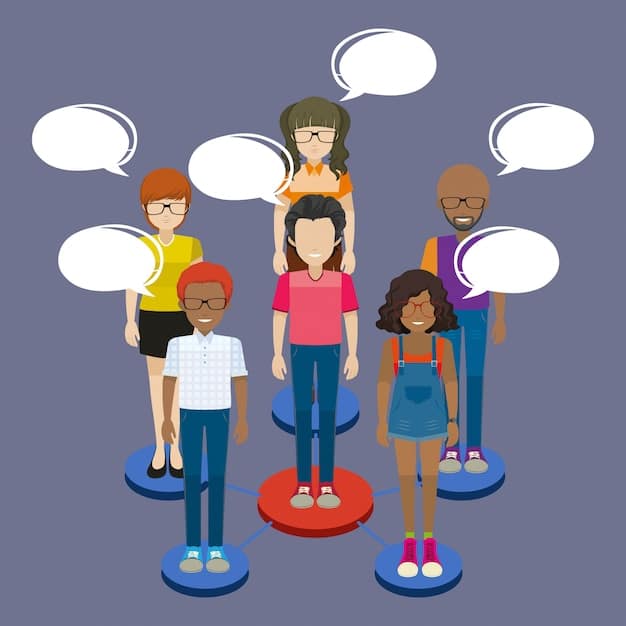Social Media’s Impact on Local Politics: Opportunities & Challenges

The Impact of Social Media on Local Politics: Opportunities and Challenges encompasses how platforms shape citizen engagement, political discourse, and campaign strategies at the local level, presenting both benefits and potential pitfalls for democratic processes.
The rise of social media has profoundly altered the landscape of political communication, and its effects are particularly evident in local politics. Understanding the impact of social media on local politics: opportunities and challenges is crucial for both citizens and politicians navigating this evolving terrain.
Social Media as a Tool for Civic Engagement
Social media platforms have emerged as powerful tools for enhancing civic engagement at the local level. They offer unprecedented opportunities for citizens to connect with their local governments and participate in political discussions.
Facilitating Direct Communication
Social media allows local politicians and government officials to communicate directly with their constituents. This direct line of communication can foster transparency and accountability.
Enhancing Voter Turnout
Social media campaigns can effectively mobilize voters and increase participation in local elections. Targeted messaging can reach specific demographics and encourage them to exercise their right to vote.
- Increased awareness of local issues and candidates.
- Simplified voter registration processes through online platforms.
- Real-time updates and reminders about upcoming elections.
- Opportunities for direct interaction with candidates, fostering a sense of connection.
Ultimately, social media’s capacity to facilitate civic engagement hinges on responsible usage and an informed citizenry.
The Spread of Information and Misinformation
While social media serves as a conduit for information, it also presents challenges related to the spread of misinformation. The rapid dissemination of unverified content can significantly impact public opinion and political discourse.

Combating Fake News
Local governments and community organizations must actively combat the spread of fake news on social media. Educating citizens on how to identify and verify information is crucial.
Promoting Media Literacy
Promoting media literacy helps individuals critically evaluate the information they encounter online. This includes understanding the sources and potential biases present in social media content.
The effective management of information dissemination on social media can help ensure a more informed and engaged electorate at the local level.
Campaigning and Fundraising in the Digital Age
Social media has revolutionized political campaigning and fundraising, offering candidates new avenues to reach potential voters and secure financial support. These digital strategies have become indispensable for modern political campaigns.
Cost-Effective Outreach
Social media provides a cost-effective means for candidates to reach a broad audience. Compared to traditional advertising, digital campaigns can offer a greater return on investment.
Microtargeting and Personalized Messaging
Microtargeting allows campaigns to tailor their messaging to specific voter segments. By analyzing data, campaigns can craft personalized messages that resonate with individual voters.
- Enhanced ability to mobilize support based on precise demographic and interest data.
- Greater efficiency in resource allocation, targeting only reachable audiences.
- Increased adaptability in campaign strategies.
Effective campaigning in the digital age depends on strategic use of data and a deep understanding of online voter behavior.
The Impact on Political Discourse
Social media has significantly altered the nature of political discourse, creating both opportunities and challenges for civil conversation. The digital space can amplify voices but also foster polarization.

Echo Chambers and Polarization
Social media algorithms can create echo chambers, where individuals are primarily exposed to information that confirms their existing beliefs. This can lead to increased polarization and a lack of understanding between different viewpoints.
Encouraging Civil Dialogue
Promoting civil dialogue on social media requires creating spaces where individuals can engage in respectful debate. This involves establishing community guidelines and moderating discussions to prevent harassment and abuse.
Mitigating the negative impacts of social media on political discourse necessitates concerted efforts to promote critical thinking and respectful communication.
Privacy and Data Security Concerns
The use of social media in local politics raises significant privacy and data security concerns. Protecting the personal information of voters and campaign staff is crucial.
Data Protection Measures
Local governments and campaigns must implement robust data protection measures to safeguard personal information. This includes complying with relevant privacy laws and regulations.
Transparency in Data Collection
Transparency in data collection practices is essential for building trust with voters. Campaigns should clearly communicate how they collect and use voter data.
- Adherence to privacy laws such as GDPR and CCPA.
- Use of encryption to protect sensitive data.
- Regular security audits to identify and address vulnerabilities.
Addressing privacy and data security concerns is key for maintaining public trust in the digital age of local politics.
The Future of Social Media in Local Politics
As social media continues to evolve, its role in local politics will likely become even more pronounced. Understanding the emerging trends and adapting to new technologies will be essential for both politicians and citizens.
Emerging Platforms and Technologies
New social media platforms and technologies are constantly emerging, offering new ways to connect with voters. Staying abreast of these developments is crucial for effective political communication.
Strategies for Sustainable Engagement
Sustainable engagement on social media requires building long-term relationships with constituents. This involves consistently providing valuable content, fostering meaningful interactions, and adapting to the preferences of the local community.
The future of social media in local politics will depend on the ability to leverage these tools responsibly and effectively to foster a more informed and engaged citizenry.
In conclusion, social media presents both unparalleled opportunities and significant challenges for local politics. From fostering civic engagement to navigating misinformation, understanding and adapting to these dynamics is essential for a healthy democratic process.
| Key Topic | Brief Description |
|---|---|
| 📢 Civic Engagement | Social media enables direct communication between citizens and local governments. |
| 📰 Misinformation | Combating fake news and promoting media literacy is vital. |
| 💰 Campaigning | Social media offers cost-effective outreach and microtargeting. |
| 🔒 Data Security | Protecting voter data and ensuring transparency is crucial. |
Frequently Asked Questions
▼
Social media facilitates direct communication between citizens and local governments, enhances voter turnout through targeted campaigns, and raises awareness of local issues.
▼
Challenges include the spread of misinformation, the creation of echo chambers leading to polarization, and concerns related to privacy and data security of voter information.
▼
Social media offers cost-effective outreach, enables microtargeting and personalized messaging to specific voter segments, and provides new avenues for fundraising and mobilizing support.
▼
Local governments and community organizations should actively combat fake news by educating citizens on how to verify information and by promoting media literacy and critical thinking skills.
▼
Implementing robust data protection measures, complying with privacy regulations, ensuring transparency in data collection practices, and educating voters about their data rights are crucial steps.
Conclusion
In summary, the landscape of local politics has been reshaped by social media. Recognizing the opportunities and addressing the challenges is crucial for maintaining an informed, engaged, and secure democratic process.





